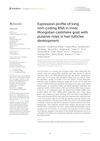 November 2019 in “Harper's Textbook of Pediatric Dermatology”
November 2019 in “Harper's Textbook of Pediatric Dermatology” The document is a detailed medical reference on skin and genetic disorders.
 176 citations,
August 2015 in “The journal of allergy and clinical immunology/Journal of allergy and clinical immunology/The journal of allergy and clinical immunology”
176 citations,
August 2015 in “The journal of allergy and clinical immunology/Journal of allergy and clinical immunology/The journal of allergy and clinical immunology” Alopecia areata involves immune activation in the scalp, suggesting treatments targeting TH1, TH2, and IL-23 pathways.
 May 2023 in “Journal of Clinical Medicine”
May 2023 in “Journal of Clinical Medicine” New understanding and treatments for hair loss are improving, but more research is needed.
 July 2023 in “IntechOpen eBooks”
July 2023 in “IntechOpen eBooks” New treatments for alopecia areata show promise, but more research is needed to confirm their effectiveness.
1 citations,
May 2024 in “International Journal of Molecular Sciences” Adenosine receptors could be promising targets for treating inflammatory skin diseases like psoriasis.
 247 citations,
August 2011 in “European Journal of Epidemiology”
247 citations,
August 2011 in “European Journal of Epidemiology” The Rotterdam Study updated its design and objectives in 2012, providing insights into various diseases in the elderly, including skin cancer, bone health, liver disease, neurological and psychiatric conditions, and respiratory issues.
 1 citations,
August 2020 in “IntechOpen eBooks”
1 citations,
August 2020 in “IntechOpen eBooks” Old drugs like finasteride and spironolactone are being successfully used for hair loss and skin conditions, and many other drugs show promise for new uses in dermatology.
 48 citations,
May 2019 in “Genome Biology”
48 citations,
May 2019 in “Genome Biology” Researchers found that certain RNA circles in the brain are linked to disease risk, but their exact role in disease is still unknown.
 January 2022 in “Figshare”
January 2022 in “Figshare” Melatonin affects different genes and pathways important for goat hair growth.
 2 citations,
September 2023 in “Aging”
2 citations,
September 2023 in “Aging” Elastic Net DNA methylation clocks are inaccurate for predicting age and health status; a "noise barometer" may better indicate aging and disease.
 2 citations,
September 2022 in “Frontiers in veterinary science”
2 citations,
September 2022 in “Frontiers in veterinary science” Certain long non-coding RNAs are important for the growth of hair follicles in Inner Mongolian cashmere goats.
 219 citations,
September 2009 in “European journal of epidemiology”
219 citations,
September 2009 in “European journal of epidemiology” The Rotterdam Study aims to understand various diseases in older adults.
 4 citations,
February 2022 in “Frontiers in molecular biosciences”
4 citations,
February 2022 in “Frontiers in molecular biosciences” Chronic stress in mice changes skin metabolism and gene expression, leading to hair loss.
 October 2021 in “Research Square (Research Square)”
October 2021 in “Research Square (Research Square)” Melatonin affects certain genes and pathways involved in cashmere goat hair growth.
 June 2021 in “Research Square (Research Square)”
June 2021 in “Research Square (Research Square)” Melatonin can increase cashmere yield by altering gene expression and restarting the growth cycle early.
 April 2023 in “bioRxiv (Cold Spring Harbor Laboratory)”
April 2023 in “bioRxiv (Cold Spring Harbor Laboratory)” Sweat gland development involves two unique skin cell programs and a temporary skin environment.
 12 citations,
November 2020 in “Molecules”
12 citations,
November 2020 in “Molecules” Carvone helps treat skin issues by reducing melanin and stopping harmful cell growth.

Wild African goats have genetic adaptations for surviving harsh desert conditions.
 9 citations,
July 2022 in “EMBO molecular medicine”
9 citations,
July 2022 in “EMBO molecular medicine” Blocking certain immune signals can reduce skin damage from radiation therapy.
 19 citations,
September 2019 in “EMBO molecular medicine”
19 citations,
September 2019 in “EMBO molecular medicine” Blocking TSLP reduces skin inflammation and cell overgrowth in psoriasis.
3 citations,
February 2021 in “FEBS open bio” Camellia japonica extract may improve scalp health and promote hair growth.
 13 citations,
March 2017 in “Genomics”
13 citations,
March 2017 in “Genomics” Genomic approach finds new possible treatments for hair loss.
 December 2024 in “Frontiers in Veterinary Science”
December 2024 in “Frontiers in Veterinary Science” Dorper sheep's wool shedding is linked to specific genes and pathways, which may help understand human hair growth.
 1415 citations,
October 2007 in “European Journal of Epidemiology”
1415 citations,
October 2007 in “European Journal of Epidemiology” The Rotterdam Study investigates diseases in older adults and has produced many research findings.
 February 2023 in “Molecules”
February 2023 in “Molecules” Cactus extract from Notocactus ottonis may help promote hair growth.
 12 citations,
December 2022 in “JEADV. Journal of the European Academy of Dermatology and Venereology/Journal of the European Academy of Dermatology and Venereology”
12 citations,
December 2022 in “JEADV. Journal of the European Academy of Dermatology and Venereology/Journal of the European Academy of Dermatology and Venereology” New oral treatments for adult hair loss show promise, especially JAK inhibitors, with mild side effects.
 April 2021 in “Journal of Investigative Dermatology”
April 2021 in “Journal of Investigative Dermatology” Spironolactone safely and effectively treats hair loss in female scarring alopecia patients.
 1 citations,
June 2023 in “Genes”
1 citations,
June 2023 in “Genes” Hair loss from Alopecia Areata is caused by both genes and environment, with several treatments available but challenges in cost and relapse remain.
3 citations,
July 2023 in “International journal of molecular sciences” Stress may contribute to hair loss in alopecia areata by affecting immune responses and cell death in hair follicles.
 February 2023 in “Asian journal of pharmaceutical research and development”
February 2023 in “Asian journal of pharmaceutical research and development” Flavonoids in Iraqi marshland plants have potential health benefits like antioxidant and anti-inflammatory effects.



























